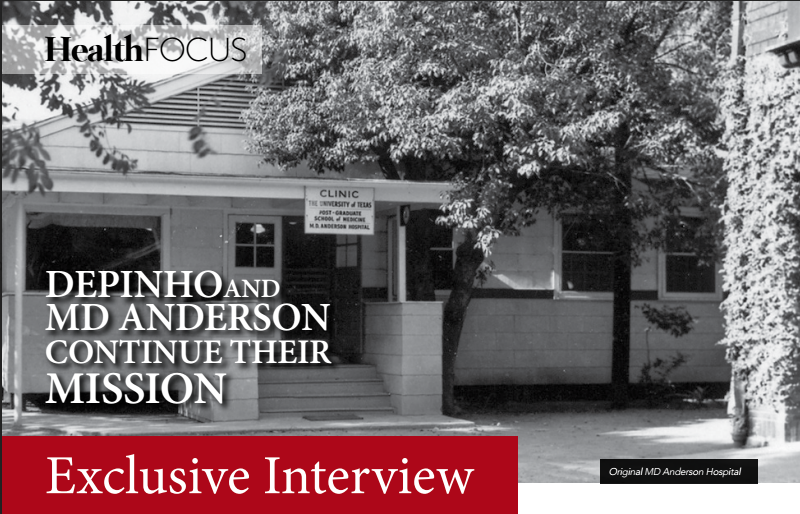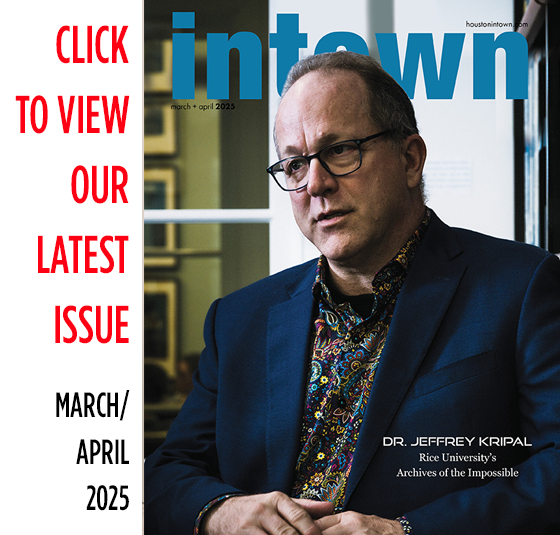
We Have Recognized but A Few of Houston’s Leaders in Medicine
by William Hanover
DR. JIM ALLISON, PH.D.
Professor and Chair of Immunology at MD Anderson. Dr.Allison Allison is currently chairman of immunology and director of Immunotherapy platform of Moon Shots at The University of Texas MD Anderson Cancer Center in Houston. He is the main person behind the breakthrough technology that is enabling the advancements of Immunotherapy and the drug Yervoy which essentially tricks the sick person’s immune system to fight their cancer. For his research and discovery he was awarded The Breakthrough Prize in Life Sciences and The Horwitz Prize which is Columbia University’s top honor for achievement in biology and biochemistry. Allison grew up in south Texas where his father was a doctor and he became interested in science. He later turned to cancer research due to losing four family members including his brother to the dreaded disease. Allison earned a bachelor’s degree in microbiology and a doctorate from UT-Austin. After a postdoctoral fellowship at Scripps Clinic in La Jolla, Allison originally joined MD Anderson in 1977. After moving to University of Cal Berkeley and memorial Sloan kettering only to return to MD Anderson in 2012. Houston is forever grateful.
JOHN B. HOLCOMB, M.D.
Director of the Memorial Hermann Texas Trauma Institute. He is also Director of the Division of Acute Care Surgery at UTHealth Medical School & Retired U.S. Army Colonel. As a U.S. Army surgeon, Holcomb treated the worst kind of injuries – soldiers badly wounded and at risk of succumbing to rapid blood loss. On the battlefield, Holcomb and his colleagues developed the protocol known as damage control resuscitation and improved patient outcomes after hemorrhagic shock, but only when the right ratio of plasma, platelets and red blood cells was administered. Until the wars in Iraq and Afghanistan, this combination was rarely used and had yet to be proven. But in his observational studies, as well as those of his fellow military trauma surgeons, Holcomb found the right mix: one part plasma, one part platelets, and one part red blood cells. In 2012, Holcomb and a team of researchers launched a large clinical trial to gauge the effect of damage control resuscitation after hemorrhagic shock on patient survival. The recently published results of the landmark study drawn from 12 trauma centers in the U.S. and Canada overwhelmingly confirmed what Holcomb and his colleagues had already discovered in combat: damage control resuscitation exceeds or matches another widely used blood transfusion protocol. This new blood transfusion protocol is now employed in most military and civilian hospitals today.
DR. MARC BOOM
President and CEO of Houston Methodist Hospital. Dr. Boom holds the reins to0 Houston Methodist, a 1,000+ bed hospital network consistently ranked among the country’s best by U.S. News & World Report, and named by FORTUNE as one of America’s “100 Best companies to Work for.” Houston Methodist is affiliated with a number of academic institutions that support its teaching and research initiatives. These include Weill Cornell Medical College, New York Presbyterian Hospital, Baylor College of Medicine, University of Houston; Texas A&M and UT-Health Science Center. Previously Dr. Boom held the positions of executive vice president of The Methodist Hospital, president and CEO of Methodist Diagnostic Hospital and president/CEO/medical director of Baylor-Methodist Primary Care Associates, a network of primary care physicians. Dr. Boom holds a B.S. in Biology with High Honors from the University of Texas at Austin, an M.D. with High Honors from Baylor College of Medicine. He completed a residency in internal medicine at Massachusetts General Hospital, Harvard Medical School and fellowships in geriatric medicine and general medicine at the Hospital of the University of Pennsylvania. He is board certified in both internal medicine and geriatric medicine. He maintains a part-time clinical practice where his special interests are preventive medicine, lipid disorders, and hypertension. Dr. Boom was named CEO Communicator of the Year by the Houston chapter of the Public Relations Society of America in 2014. The American Heart Association awarded Dr. Boom the “2006 Distinguished Service Award” and in 2012, Dr. Boom and his wife Dr. Julie Boom received the “Good Samaritan Award” from Interface-Samaritan Counseling Centers.
DR. GAVIN W. BRITZ
Chairman of neurosurgery and co-director of the Methodist Neurological Institute. Britz was former director of the Cerebrovascular Center at Duke University Medical Center before replacing the longtime Methodist department chairman Dr. Robert Grossman, who previously developed the Methodist Neurological Institute into the leader it is today. Britz leads an acclaimed team of neurosurgeons and affiliated professionals and is recognized as one of the nation’s foremost cerebrovascular, skull base and brain tumor surgeons. Methodist neurosurgeons perform approximately 2,600 procedures each year. He is on the advisory boards of the Joe Niekro Foundation and The Brain Aneurysm Foundation.He has authored more than 90 peer reviewed scientific manuscripts and 28 chapters for various neurosurgical books. Britz’s goal is to enhance research expertise in the areas of brain tumors, cerebrovascular disease, spine and peripheral nerve, functional and pain disorders, and epilepsy. In addition to his leadership role, Britz plans to continue a robust practice treating aneurysms using microsurgical and endovascular techniques. Britz received his medical degree from the University of Witwatersrand in South Africa; and completed his Internship at Johns Hopkins Hospital.
DR. ANDREA STOLAR
She holds dual positions as Director of Residency Education and Director of Forensic Psychiatry at Baylor College of Medicine and also Medical Director for the Veterans Court Programs at the Veterans at Michael E. DeBakey Veteran Affairs Medical Center in Houston, Dr. Stolar was on the planning team for the Harris County Felony Mental Health Court, chairing the Clinician’s Committee, and was one of the founders of the Harris County Veterans Court, a felony mental health/drug court, and the first Veterans Court in the state of Texas. As a result of her efforts there are now additional Veterans Courts created in Montgomery, Harris (misdemeanor), Galveston and Fort Bend Counties.The focus of her work is with veterans, most of whom suffer from post traumatic stress disorder. Her clinical and research work at Baylor College of Medicine has been the development of jail diversion programs and the care and treatment of justice-involved veterans. Dr. Stolar received her medical degree from Baylor College of Medicine and pursued her psychiatric residency at Baylor College of Medicine, completing her training at the University of South Florida in Tampa Florida. She did fellowships in suicide studies at the Clarke Institute at University of Toronto and in Forensic Psychiatry at Case Western Reserve University. Dr. Stolar returned to Texas in 2008 and Houston is a better place because of it.
HUDA Y. ZOGHBI, M.D.
Director of the Jan and Dan Duncan Neurological Institute at Texas Children’s Hospital. She is also an investigator with the Howard Hughes Medical Institute, and a professor at Baylor College of Medicine, She recently learned that the protein, MeCP2, influences the expression of thousands of other genes, and variations in the protein’s levels can result in a range of disorders, including autism and early-onset schizophrenia. Her breakthrough research earned her the 2014 March of Dimes Prize in Developmental Biology. Rett syndrome is one of the most common causes of intellectual disability in girls. Affected children withdraw socially and often cry endlessly. “Dr. Zoghbi’s contributions to our understanding of several entirely different neurological disorders, including her finding of the genetic basis of Rett syndrome, have opened new areas of research,” says Joe Leigh Simpson, MD, senior vice president for Research and Global Programs at the March of Dimes. Dr. Zoghbi left Lebanon in 1976 during that country’s civil war and transferred from the American University of Beirut to Meharry Medical College in Tennessee. She finished her post doctorate fellowship at Baylor College of Medicine, where she has remained for more than three decades. She was the first woman from Baylor to be elected into the Institute of Medicine and the National Academy of Sciences. The March of Dimes Prize in Developmental Biology is awarded annually to investigators advancing the science that underlies the understanding of birth defects. The Foundation created the Prize as a tribute to Dr. Jonas Salk. President Franklin D. Roosevelt was the March of Dimes founder.
DAN WOLTERMAN
President and Chief Executive Officer of Memorial Hermann. The only non doctor on our list, Wolterman oversees Houston’s largest healthcare employer. There were 57,000 emergency visits and over 20,000 surgeries performed at Memorial Hermann -Texas Medical Center just last year. Memorial Hermann is also the state’s largest not-for-profit healthcare system. Wolterman arrived at Memorial Hermann in 1999 and was promoted to CEO in 2002. He recently forged an alliance with MD Anderson Cancer Center to work together and interpret breast imaging at most Memorial Hermann hospitals A melanoma cancer survivor himself, Wolterman has been busy recently, acquiring the Houston Orthopedic and Spine Hospital to strengthen their already strong position in orthopedic and rehab work. They also have five facilities under construction throughout greater Houston.Wolterman arrived at Memorial Hermann in 1999 and was promoted to CEO in 2002. For the last eight years he has been named one of the “Most Influential People” in healthcare by Modern Healthcare Magazine. He has a business degree and MBA in Finance and a Masters from Xavier in Healthcare Administration.
DAVID I. SANDBERG, M.D.
Director of Pediatric Neurosurgery at Children’s Memorial Hermann HospitalSandberg is also director of the Memorial Hermann Mischer Neuroscience Institute at the Texas Medical Center & Associate Professor in the Department of Pediatric Surgery at UTHealth Medical School Sandberg has pioneered novel, minimally invasive treatment approaches for malignant brain tumors in kids. Traditional chemo treatments flood the body with toxic chemicals, resulting in harsh side effects such as damage to other organs, development of secondary cancers, growth issues, hormonal issues and fertility issues. Sandberg says that he has even seen more patients tragically die from the cancer treatment than from the disease itself. So he found a better way. Most recently, the animal models he developed led to a pilot clinical trial which was just completed at Children’s Memorial Hermann Hospital and MD Anderson Cancer Center. In this trial, chemotherapy was delivered directly into the fourth ventricle of the brain – where no one has done it before – in children with malignant brain tumors. Preliminary results have been extremely promising and have led to two additional clinical trials testing this concept. Sandberg is actively changing the face of cancer treatment for children.
DEPINHO AND MD ANDERSON CONTINUE THEIR MISSION
Intown: In 2012 upon your arrival at MD Anderson you launched with great fanfare the Moon Shots Program that was to “attack and cure cancers.” So far, what are the most significant contributions from this program?
DePinho: Two and a half years ago, we harnessed our talent and scale to launch the Moon Shots Program, acomprehensive assault focused on applying knowledge in hand today to dramatically reduce cancer deaths in the coming decade. The program comprises large, multi-disciplinary teams of MD Anderson researchers and clinicians working to convert discoveries into educational initiatives, prevention-oriented policies, smart clinical trials, mobile-enabled cognitive computing technology to spread knowledge efficiently, and drug development platforms to fill our pipeline with novel drugs that offer hope to our patients. The Moon Shots Program already has made progress in our fight to end cancer:
• Our efforts in Immunotherapy treatment have been groundbreaking. Discovered by our own Dr. Jim Allison, immunotherapy unleashes a patient’s own immune system to fight cancer cells. The results have been significant and efforts are underway to expand our knowledge and use of this novel therapeutic class of agents through many new clinical trials.
• In Cancer Control, our efforts have led to new laws to protect children from tanning beds and increased melanoma risk in 11 states, with 15 others in play; moreover, we have provided sun-protection curriculum to thousands of K-8 schools in the US.
• Our ovarian cancer team has implemented a new algorithm that has increased complete surgical resection from 20 percent to an astounding 88 percent. Complete surgical resection at surgery is a strong correlate of improved survival.
• And a new two-drug combination has produced durable complete responses for nearly all chronic lymphocytic leukemia patients — making CLL a moon shot we may retire early.
These are true breakthroughs that wouldn’t have happened as rapidly and decisively without the talent of our faculty and the dedication of our supporters from Houston and around the world. There’s still more to be done for our 10-year plan, but we’re making great progress.
I: When we first interviewed you we asked what was your biggest challenge as head of MD Anderson and you stated communication. What have you learned over the last three years you could share with us?
D: The last three years have been extremely rewarding. What I’ve learned is that communication — both listening and sharing information — remains one of the most important parts of my leadership team. We’ve spent a great deal of time walking around the cancer center, inviting members of our faculty to small-group discussions and more because we all learn so much in the process. What I already knew — and have continued to experience — is that our faculty members and staff are the best of the best. The depth of their genius and devotion across all areas of cancer science and patient care is unmatched anywhere else. I’m also so proud of the dedication and passion of our staff and volunteers. And to top it all off, I’m proud of the true global influence of MD Anderson due to our research, patient care, education and prevention efforts that have the ability to impact the course of cancer near and far.
I: What if any cancers are we close to eradicating?
D: Cancer will never be eradicated, but what we can do is develop approaches that prevent the disease from happening in the first place, detect it early when the chances for cure is greatest, and directly influence the course of established disease and preserve the quality of life. Through our Moon Shots Program, we already are seeing major advances in the areas of chronic lymphocytic leukemia and melanoma, where durable responses and hope have replaced pain and despair. This is an exciting time in our field and many more advances are on the way.
I: There has been a lot in the news about the prices of many cancer drugs. One of your esteemed colleagues, Hagop Kantarjian is leading a crusade to encourage participation to fight these costs on many levels. What can and should be done about the exorbitant costs of some of the drugs needed by your patients?
D: The cost of cancer care is something we take seriously, and we have several programs available that offer financial support and access to drugs for patients in need. Looking at the bigger picture, the cost is due in part to the high rate of failure in cancer drug development. To help address that issue, we launched the Institute for Applied Cancer Science in order to integrate drug discovery and functional genomics to increase the probability of discovering effective cancer therapies and therefore driving down development costs. We also created the Institute for Personalized Cancer Therapy to support preclinical research and clinical trials in which a patient’s tumor biopsy is tested for abnormal genes and gene products to select targeted treatments that allow for personalized care and improved outcomes.























